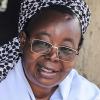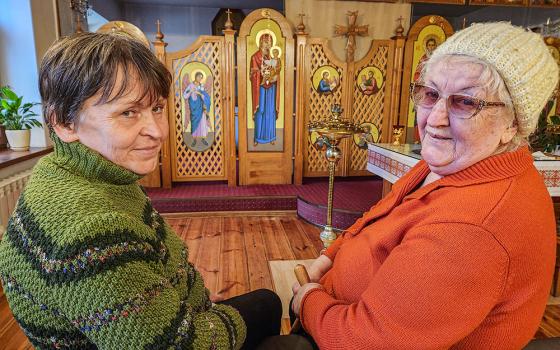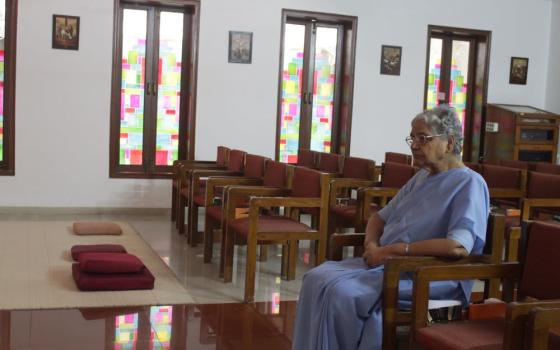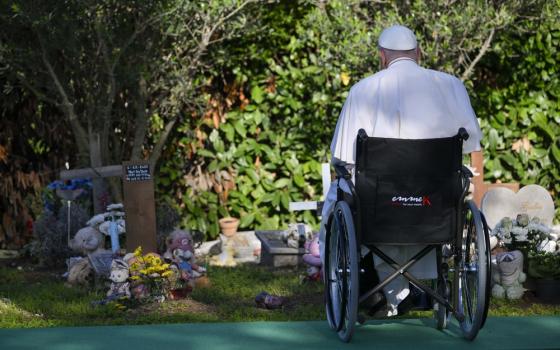
Carol Ntaulo and her 3-year-old daughter, Besa (Courtesy of Matilda Mubanga)
I am the project manager of the Daughters of the Redeemer in Zambia and have been closely following the epidemic of cholera that began in October 2023, but became especially dangerous in January 2024 in Lusaka.
The disease began to spread further, and our hospital, St. Thomas Mission Hospital in a remote rural area of Chibombo district of Central Zambia, began noticing that cases increased when people returned from trips to Lusaka, the epicenter of the disease.
Below is one of the stories of a young mother and her child.
Case story: Besa Ntaulo (3-year-old cholera patient)
The morning of Jan. 16 was not business as usual for 25-year-old Carol Ntaulo as her 3-year-old child, Besa, woke up unwell with symptoms too serious for Carol to handle by herself. She sought help at St. Thomas Mission Hospital in Chibombo, where Besa was diagnosed with cholera.
The next few days were a roller coaster ride of ups and downs. Carol had thought only a few hours would be needed. However, the procedures for cholera treatment required admission to a hospital for much-needed medical care and to curb further spread of the disease. With prompt action, Besa fully recovered and was discharged within three days.
Reacting to the cholera diagnosis, Carol stated, "It sent shivers down my spine when I heard what the symptoms indicated and feared the most. It was a terrible experience to be in that isolation ward looking at my baby lying helplessly. I thought this was the end."
Advertisement
"Family members were not allowed to visit us, and this made me feel miserable even though there were other mothers in the ward. However, with the medical attention and counsel we received, hope returned that my daughter would be fine."
Given what she went through, Carol, going forward, will ensure that her family and community adhere to preventive measures, such as drinking chlorinated or boiled water, washing fruits and other foodstuffs with clean water, and washing hands with soap. She further committed to being an ambassador of good hygiene in her community, championing clean environments and the use of pit latrines.
This is only one story that was multiplied in Lusaka, capital of Zambia, and beyond. Cholera is not new to Zambia. As far back as people can remember, the country has experienced outbreaks. We know that it primarily impacts shanty communities or remote rural areas that lack basic sanitation and safe water.
Cholera is a terrible diarrheal disease caused by ingestion of contaminated food and water. Even flies can infect food that has been lying about and is eaten later.
Vomiting and diarrhea are major symptoms that cause rapid dehydration and, in its acute state, can kill within hours. People having been in contact with the bacteria may not show symptoms for up to 10-14 days but are still able to transmit the disease within that period.
Although cholera affects people of all ages, children are particularly at risk. In city or town shanty compounds and rural situations where children usually play outdoors, they easily pick up things to put in their mouths. If these are contaminated, their immature immune systems are often unable to ward off infection.
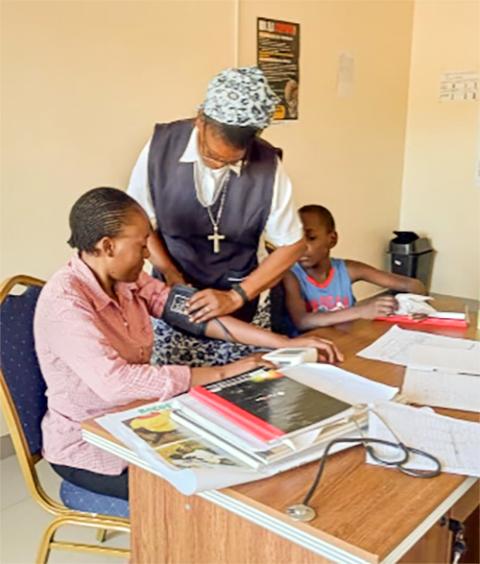
St. Thomas Mission Hospital is run by the Daughters of the Redeemer in Chibombo, Zambia. (Courtesy of Matilda Mubanga)
To make things worse, our country is experiencing one of the worst food crises in our history, and many children with malnutrition are at an even higher risk of contracting cholera.
Fortunately, since 2019, owing to the governmental tight sanitation requirements and movement limitations due to COVID-19, the country recorded a quiet period of nearly three years, recording only 359 cases in 2022.
To our distress, the current outbreak is projected to be one of the greatest the country has ever experienced. Zambia National Public Health Institute first reported an outbreak of cholera in Lusaka in October 2023. As of Jan. 2, 2024, Zambia recorded 3,757 confirmed cases and 128 deaths. Of particular concern now is the outbreak's evolution in Lusaka, where in just a week, an increase of 71.2% in cases and 175% in deaths was reported.
By Jan. 12, the outbreak continued to expand as people traveled from Lusaka into the rural areas. Eventually, 39 districts in nine provinces were impacted, resulting in 8,276 cumulative cases and 333 deaths.
St. Thomas Mission Hospital, run by Daughters of the Holy Redeemer, is located in a remote area of Chibombo district of Central Province. The sisters, recording more than 16 cholera cases being traced to persons who had recently traveled to Lusaka, promptly set up a cholera isolation center and workforce preparedness plan as current staff levels were inadequate. The majority of first admissions were babies under the age of 5.
This was only the beginning of a journey that would see St. Thomas Mission Hospital stretched to its limits in terms of finances, supplies and personnel. Cholera quickly depleted resources. At the hospital, provisions of chlorine, cholera vaccines, drugs and protective clothing for medical personnel were and remain a priority in the fight against the epidemic.
Working in a cholera center is extremely taxing, keeping personnel on their toes with no time to rest. Taking care of 10 cholera patients demands more than that of a full ward of general patients. The cholera isolation center continues to receive patients from the surrounding communities, while calling for swift preventive and curative measures to curb further spread.
Sisters initiated community sanitizations, provisions for safe and clean drinking water, and proper sanitation facilities. These remain key in the fight against the epidemic as the majority of families do not have access to clean water, sanitation or hygiene facilities.
We can only hope that our efforts and those in our communities will help end this traumatic epidemic.
